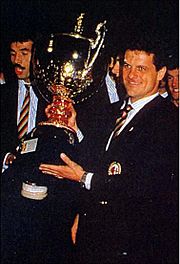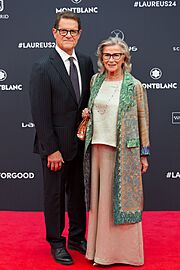Fabio Capello facts for kids
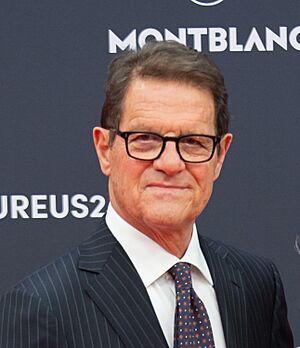
Capello in 2024
|
|||
| Personal information | |||
|---|---|---|---|
| Full name | Fabio Capello | ||
| Date of birth | 18 June 1946 | ||
| Place of birth | San Canzian d'Isonzo, Italy | ||
| Height | 1.77 m (5 ft 10 in) | ||
| Position(s) | Midfielder | ||
| Youth career | |||
| 1962–1964 | SPAL | ||
| Senior career* | |||
| Years | Team | Apps | (Gls) |
| 1964–1967 | SPAL | 49 | (3) |
| 1967–1970 | Roma | 62 | (11) |
| 1970–1976 | Juventus | 165 | (27) |
| 1976–1980 | AC Milan | 65 | (4) |
| Total | 341 | (45) | |
| International career | |||
| 1972–1976 | Italy | 32 | (8) |
| Managerial career | |||
| 1982–1986 | AC Milan Primavera | ||
| 1987 | AC Milan (caretaker) | ||
| 1991–1996 | AC Milan | ||
| 1996–1997 | Real Madrid | ||
| 1997–1998 | AC Milan | ||
| 1999–2004 | Roma | ||
| 2004–2006 | Juventus | ||
| 2006–2007 | Real Madrid | ||
| 2007–2012 | England | ||
| 2012–2015 | Russia | ||
| 2017–2018 | Jiangsu Suning | ||
| *Club domestic league appearances and goals | |||
Fabio Capello (born on 18 June 1946) is a famous Italian former professional football manager and player.
As a player, Capello played for teams like SPAL, Roma, AC Milan and Juventus. He was a midfielder and won many awards during his career, which lasted over 15 years. He won the Coppa Italia with Roma in 1969. He was most successful with Juventus, winning three Serie A titles in 1972, 1973, and 1975. With Milan, he won the Coppa Italia again in 1977 and another Serie A title in 1979. Capello also played for the Italian national team, playing 32 games and scoring 8 goals.
In his first five years as a manager, Capello won four Serie A titles with Milan. He also won the 1993–94 UEFA Champions League, beating Barcelona 4–0 in a memorable final. He then managed Real Madrid for a year, winning the La Liga title right away. In 2001, he led Roma to their first league title in 18 years. Capello also won two titles with Juventus, but these were later taken away due to a scandal. In 2006, he returned to Real Madrid and won another La Liga title. He is known as one of the greatest football managers ever.
Capello became the manager of the England national team in December 2007. He helped England qualify for the 2010 FIFA World Cup, where they were knocked out in the second round. He also guided them to UEFA Euro 2012, where they reached the quarter-finals under a new manager. In February 2012, he left his role due to a disagreement with The Football Association. He then became the coach for the Russian national team in July 2012. He was later let go by the Russian Football Union in July 2015. In 2017, he coached the Chinese club Jiangsu Suning but was sacked the next year. After that, he retired from coaching.
Contents
- Playing Career Highlights
- International Games for Italy
- Capello's Playing Style
- Becoming a Manager
- Capello's Coaching Style
- Personal Life
- Career Statistics
- Managerial Statistics
- Honours and Awards
- See also
Playing Career Highlights
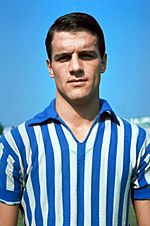
Fabio Capello started his football journey with SPAL. He joined them for two million lire, even though Milan was also interested. In his second year with the youth team, he helped them win the Italian Youth Championship. He played his first senior game on 29 March 1964.
Capello was a smart and talented holding midfielder. He was good at understanding the game and strong in tackles, even if he wasn't very tall. He often played as a deep-lying playmaker, creating chances for his teammates with his excellent passing. He could also score goals from midfield with powerful shots and was good at penalty kicks. With SPAL, he played four games before the team was relegated from Serie A. After they returned to the top division, Capello became a key player in the 1965–66 season, helping them stay in Serie A. He was also called up to the Italian under-23 team. However, a knee injury limited his games the next season.
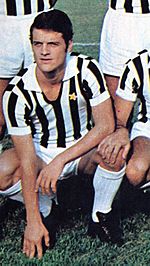
In 1967, Capello moved to Roma and became a very important player. In his first season, he helped them reach first place early on. But his knee injury returned, keeping him out for the rest of the season. Roma finished tenth that year. The next season, Capello scored six goals as Roma finished eighth and won his first major trophy, the Coppa Italia. This allowed Roma to play in the Anglo-Italian League Cup. They also reached the semi-finals of the European Cup Winners' Cup.
He was then sold to Juventus in 1970. Capello became a very important player for Juventus, even though he was only 24. He wore the number 10 shirt. Juventus won the league title in the 1971–72, 1972–73 and 1974–75 seasons. They also reached the 1973 European Cup final, but lost to Ajax. They missed out on winning two trophies in 1973 after losing to Milan in the Coppa Italia final.
Juventus was worried about Capello's knee injuries. So, they traded him to Milan in 1976. He played well in the 1976–77 season. However, he played only eight games in the 1978–79 season when Milan won the title. He played only three games in the 1979–80 season before deciding he could no longer play professionally.
International Games for Italy
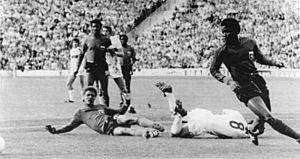
Capello played 32 times for Italy between 1972 and 1978, scoring 8 goals. His first international game was on 13 May 1972, against Belgium. He is especially remembered for scoring the goal that helped Italy beat England 1–0 at Wembley Stadium for the first time ever on 14 November 1973. Capello himself said this was the best moment of his playing career. He scored Italy's only goal against Poland during the 1974 World Cup. However, Italy lost that match and did not make it to the next round.
Capello's Playing Style
Capello was considered one of the best Italian players of his time. He was a talented, energetic, and smart holding midfielder. He had a good sense of where to be on the field and was strong in the air and in tackles. He usually played in the middle of the field as a deep-lying playmaker. His great technique and vision allowed him to start his team's attacks and create chances for others. He was also an excellent passer with both feet.
Even though he played a defensive role, he was good at attacking too. He had a powerful and accurate shot and was good at penalty kicks. He could also make late runs into the penalty area to score. However, he was not very fast and was known for not always working as hard as some other players.
Becoming a Manager
After retiring as a player, Capello spent several years as a football expert on Italian TV. He also had a short time as a temporary manager for Milan in 1987. Later, he became the main coach for Milan in 1991.
Early Coaching Years
Capello started coaching in the early 1980s, visiting Scotland to learn more. He worked with youth teams at Milan, helping young talents like Paolo Maldini and Alessandro Costacurta. He led the under-19 team to win many youth tournaments. He finished his coaching courses in 1986.
In 1987, he became the first-team coach and helped Milan qualify for the UEFA Cup. However, Silvio Berlusconi hired Arrigo Sacchi as the new manager, and Capello stepped aside but continued to work for the club.
First Time at Milan
Capello took over as Milan manager in June 1991. Some people were unsure about this choice. Capello kept many of the same players and tactics that Sacchi used. He brought in young players like Demetrio Albertini and goalkeeper Sebastiano Rossi. Milan won the Serie A title in 1991–92 without losing a single game.
He spent a lot of money to sign winger Gianluigi Lentini, which was a world record at the time. He also signed other talented players like Jean-Pierre Papin and Dejan Savićević. With stars like Marco van Basten and Ruud Gullit, Capello was one of the first managers to use a "squad rotation" system, meaning he would switch players often to keep them fresh. Milan dominated the league in the 1992–93 season, winning the Serie A title again. They also reached the 1993 UEFA Champions League final, but lost to Marseille. Milan went unbeaten for 58 league games, a record in Italian football, from May 1991 to March 1993.
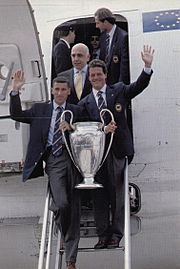
For the 1993–94 season, Capello signed new players like Marcel Desailly. He used Desailly, who was a defender, as a holding midfielder. This helped the rest of the midfield attack more. His team lost to São Paulo in the 1993 Intercontinental Cup. However, they won the Serie A title for the third year in a row and won the 1994 Champions League final with a 4–0 victory over Johan Cruyff's Barcelona. Milan's defence that season was incredibly strong, letting in only 15 goals in 34 games. Their back four, including Franco Baresi and Paolo Maldini, is considered one of the best ever.
In the 1994–95 season, Milan struggled a bit. They lost in the 1994 Intercontinental Cup but won the 1994 Supercoppa Italiana and the 1994 European Super Cup. They reached their third Champions League final in a row in 1995, but lost to Ajax. They finished fourth in the league that year.
For the 1995–96 season, Milan signed star strikers George Weah and Roberto Baggio. Capello managed to use all his talented attackers well. Milan won the league title that season, their fourth in five years.
First Time at Real Madrid
Capello became the new coach of Real Madrid in 1996. His main job was to make the team's attacking players work together. He used a three-man attack, even though he was known for being a careful and defensive coach. He led Real Madrid to win the Spanish league title in 1997. Real beat their rivals Barcelona by just two points. Even though he only stayed for a year, he brought in important players like Davor Šuker and Roberto Carlos who helped the club win the Champions League in later years.
Second Time at Milan
Capello returned to Milan for a short time, but it was not as successful. Many of the old players had left, and new signings did not play well together. The team only won 11 games all season. Milan finished tenth in the 1997–98 Serie A season. Capello left the club after that.
Managing Roma
After leaving Milan, Capello took a short break. In May 1999, he became the manager of Roma, the club he had played for 30 years earlier. He signed Walter Samuel to make his defence stronger and Gabriel Batistuta as a main goalscorer. Capello changed his team's formation to an attacking 3–4–1–2, which allowed their star player and captain Francesco Totti to play as an attacking midfielder.
The season started tough, but Roma's results got much better. They won the 2000–01 Serie A title, which was Roma's first major trophy in ten years and only their third Italian championship ever. Capello was praised for his smart choices in the final match.
Capello signed a new contract in April 2002. The 2001–02 season was a close fight between Roma and Juventus. Roma finished second, just one point behind Juventus. The next season, Roma finished eighth. Their Champions League hopes also ended after losing to Arsenal. Roma lost the Coppa Italia final to Milan. Capello's last year at Roma started well, with the team playing much better football. They had a seven-game winning streak before Christmas. Capello felt he had done all he could with Roma and started thinking about moving.
Managing Juventus
In 2004, Capello left Roma to join Juventus. This move surprised many people because he had kept it a secret. One of his first moves was to sign Emerson from Roma, which made many Roma fans angry. Capello's Juventus reached the quarter-finals of the 2004–05 and 2005–06 Champions Leagues. Juventus also won the 2004–05 and 2005–06 league titles under Capello. However, these titles were later taken away due to a football scandal.
In July 2006, Capello resigned as Juventus manager. He was strongly linked with a return to Real Madrid, and on 5 July 2006, Real Madrid announced he was their new coach.
Second Time at Real Madrid
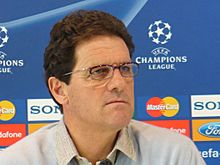
In 2006, Capello took charge of a Real Madrid team that had not won a trophy in a long time. He was criticized by some fans for his defensive playing style. Capello said that winning was more important than playing beautifully. His goal was to bring the league title back to Madrid.
At Real Madrid, Capello had some disagreements with players like David Beckham and Ronaldo. He also had issues with Antonio Cassano. Despite the problems, Capello brought Beckham back into the team, which helped the team recover. A series of good results helped Madrid climb to the top of the league.
Real Madrid won their 30th league title on the final day of the season, beating Mallorca 3–1 at home. Even though he won the league, Capello was sacked on 28 June 2007. This was because of his careful playing style, which some fans found boring compared to Real Madrid's usual attacking style.
Managing England
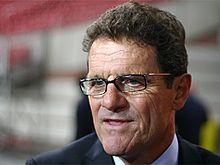
Capello was officially named manager of the England national team on 14 December 2007. He started his job on 7 January 2008. Many English fans and the press were happy about his appointment. They liked his reputation as a strict coach, which was different from previous managers.
England's first game with Capello as manager was against Switzerland on 6 February 2008, which England won 2–1. England lost their second game to France 1–0. Capello rotated the captaincy among several senior players at first. On 19 August 2008, he announced that John Terry would be the permanent captain.
World Cup Qualification Success
England started Capello's first competitive campaign with a 2–0 win over Andorra in September 2008. Four days later, England beat Croatia 4–1, with Theo Walcott scoring three goals. England continued to win, making it their best start ever to a World Cup qualifying campaign. They also beat Germany 2–1 in November 2008.
In 2009, England beat Slovakia 4–0 and drew 2–2 with the Netherlands. On 9 September 2009, Capello successfully led England to qualify for the 2010 World Cup after a 5–1 win at home to Croatia. England finished as the top scorers in their qualifying group with 34 goals.
2010 World Cup Journey
In March 2010, England beat Egypt 3–1 in a friendly. Two months later, they beat Mexico by the same score. On 2 June 2010, Capello confirmed he would stay with England until after Euro 2012. England's preparation for the World Cup had a setback when John Terry was removed as captain.
England drew their first World Cup game 1–1 with the United States due to a mistake by goalkeeper Robert Green. This was followed by a 0–0 draw against Algeria, which led to a lot of criticism. On 23 June, Capello led England into the round of 16 after they beat Slovenia 1–0. However, they were beaten 4–1 by Germany in their first knockout match.
After England's exit, Capello was criticized for being too strict at the training camp. His 4–4–2 formation was called "outdated." Capello's choices for the squad were also questioned, especially picking players who were not fully fit. On 2 July 2010, The Football Association (FA) announced that Capello would remain as England manager.
Euro 2012 Qualification and Resignation
England started their Euro 2012 qualifying campaign with two wins. They then drew 0–0 against Montenegro. Capello made some changes, bringing back John Terry as captain. England beat Wales 2–0 in March 2011. On 7 October 2011, England qualified for the European Championships with a 2–2 draw in Montenegro. England finished their campaign without any defeats. Capello resigned on 8 February 2012 after the FA removed the captaincy from John Terry.
Managing Russia
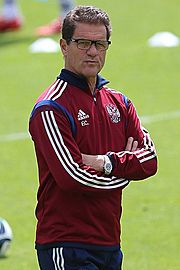
On 26 July 2012, Capello became manager of the Russia national team. His first game was a 1–1 draw with Ivory Coast. Capello led Russia to qualify for the 2014 World Cup finals, finishing first in their group. In January 2014, Capello agreed to stay with the Russia national team until the end of the 2018 World Cup.
At the 2014 World Cup, Russia was knocked out in the group stage. During qualifying for UEFA Euro 2016, Capello had mixed results. On 14 July 2015, Capello was sacked as Russian manager.
Jiangsu Suning and Retirement
On 11 June 2017, Capello signed a contract with Chinese club Jiangsu Suning. The club finished 12th in the league that year. On 28 March 2018, Capello was sacked after only three games into the new season. In April 2018, he officially announced that he had retired from coaching.
Capello's Coaching Style
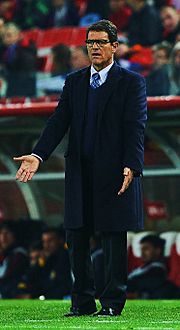
Fabio Capello is known as one of the greatest and most successful football managers. He is described as a "pragmatic" coach, meaning he focuses on getting results. He is also known for being able to change his tactics to fit his players. The Spanish media called him "Don Fabio". People praise him for his success, tactical knowledge, and leadership. He often helped develop young players.
However, he has also been criticized for being too strict and defensive. This led to disagreements with some players and other managers. But he liked to have players with strong leadership skills in his teams. Capello has said his coaching idea is to learn from others and improve. He has also been criticized for being a bit arrogant and stubborn.
In his very successful first time at Milan, Capello kept many of the same players and the 4–4–2 formation. His style was less demanding than the previous manager's, which gave his attackers more freedom. Later, he used a more careful 4–1–4–1 formation, relying on a strong defence. He also rotated his attacking players to get the best out of them.
In his first time with Real Madrid, Capello built a team that won titles with a strong defence and efficient play. He also used three strikers. A key part of the team's success was the left-back Roberto Carlos, who made great attacking runs.
When he managed Roma and won the title in 2000–01, Capello used a 3–4–1–2 formation. This allowed Francesco Totti to play as an advanced playmaker behind two strikers. The team also had strong defensive midfielders.
At Juventus, Capello went back to his preferred 4–4–2 formation. He built a balanced and efficient team with a strong defence and dynamic midfielders. He often paired David Trezeguet with Zlatan Ibrahimović up front. Capello also brought in young players like Giorgio Chiellini.
In his second time with Real Madrid, Capello used a 4–2–3–1 formation. This formation had two defensive full-backs and two defensive midfielders. While his team was efficient, some people found their playing style boring. Despite the criticism, Capello made bold decisions, like bringing David Beckham back into the starting team. He was able to create an organized and determined team. He led the club to win the league title, but he was still sacked at the end of the season.
Personal Life
Capello was born in San Canzian d'Isonzo, Italy. His parents were Guerrino and Evelina Capello. Capello is a religious Catholic and prays twice a day. His father was a schoolteacher and played football. His uncle Mario Tortul was also a football player for Italy in the 1960s. Capello has spent his whole adult life working in football. He has been married to his wife Laura for over 40 years. He met her on a bus when they were teenagers. His son, Pier Filippo, works as his agent.
Capello loves fine art. His art collection is said to be worth a lot of money. His favorite artist is reportedly Wassily Kandinsky.
Capello has right-wing political views. He has supported different political parties over the years. In 2006, he caused some discussion when he spoke about the "order" left by a Spanish dictator. He later clarified that he did not mean to praise dictatorships. He has said he supports trade unions, which help workers.
Career Statistics
Club Appearances and Goals
| Club | Season | League | Coppa Italia | Europe | Total | |||||
|---|---|---|---|---|---|---|---|---|---|---|
| Division | Apps | Goals | Apps | Goals | Apps | Goals | Apps | Goals | ||
| SPAL | 1963–64 | Serie A | 4 | 0 | ||||||
| 1964–65 | Serie B | 9 | 0 | |||||||
| 1965–66 | Serie A | 20 | 1 | |||||||
| 1966–67 | Serie A | 16 | 2 | |||||||
| Total | 49 | 3 | ||||||||
| Roma | 1967–68 | Serie A | 11 | 1 | ||||||
| 1968–69 | Serie A | 25 | 6 | |||||||
| 1969–70 | Serie A | 26 | 4 | |||||||
| Total | 62 | 11 | ||||||||
| Juventus | 1970–71 | Serie A | 27 | 5 | ||||||
| 1971–72 | Serie A | 29 | 9 | |||||||
| 1972–73 | Serie A | 27 | 3 | |||||||
| 1973–74 | Serie A | 27 | 4 | |||||||
| 1974–75 | Serie A | 28 | 3 | |||||||
| 1975–76 | Serie A | 27 | 3 | |||||||
| Total | 165 | 27 | ||||||||
| AC Milan | 1976–77 | Serie A | 26 | 1 | ||||||
| 1977–78 | Serie A | 28 | 3 | |||||||
| 1978–79 | Serie A | 8 | 0 | |||||||
| 1979–80 | Serie A | 3 | 0 | |||||||
| Total | 65 | 4 | ||||||||
| Career total | 341 | 45 | ||||||||
International Appearances and Goals
| National team | Year | Apps | Goals |
|---|---|---|---|
| Italy | 1972 | 6 | 1 |
| 1973 | 8 | 3 | |
| 1974 | 6 | 1 | |
| 1975 | 4 | 1 | |
| 1976 | 8 | 2 | |
| Total | 32 | 8 | |
Managerial Statistics
| Team | Nat | From | To | Record | |||||||
|---|---|---|---|---|---|---|---|---|---|---|---|
| G | W | D | L | GF | GA | GD | Win % | ||||
| Milan (caretaker) | 5 April 1987 | 3 July 1987 | 7 | 3 | 3 | 1 | 7 | 3 | +4 | 42.86 | |
| Milan | 20 June 1991 | 31 May 1996 | 249 | 142 | 77 | 30 | 410 | 169 | +241 | 57.03 | |
| Real Madrid | 31 May 1996 | 23 June 1997 | 48 | 31 | 12 | 5 | 96 | 41 | +55 | 64.58 | |
| Milan | 24 June 1997 | 20 May 1998 | 44 | 16 | 14 | 14 | 53 | 52 | +1 | 36.36 | |
| Roma | 6 June 1999 | 28 May 2004 | 241 | 118 | 73 | 50 | 402 | 222 | +180 | 48.96 | |
| Juventus | 28 May 2004 | 4 July 2006 | 105 | 68 | 24 | 13 | 181 | 81 | +100 | 64.76 | |
| Real Madrid | 6 July 2006 | 28 June 2007 | 50 | 28 | 12 | 10 | 91 | 55 | +36 | 56.00 | |
| England | 14 December 2007 | 8 February 2012 | 42 | 28 | 8 | 6 | 89 | 35 | +54 | 66.67 | |
| Russia | 16 July 2012 | 13 July 2015 | 33 | 17 | 11 | 5 | 56 | 22 | +34 | 51.52 | |
| Jiangsu Suning | 11 June 2017 | 28 March 2018 | 24 | 8 | 7 | 9 | 36 | 34 | +2 | 33.33 | |
| Total | 843 | 459 | 241 | 143 | 1,421 | 714 | +707 | 54.45 | |||
Honours and Awards
As a Player
- SPAL
- Serie B promotion: 1964–65
- Roma
- Coppa Italia: 1968–69
- Juventus
- Serie A: 1971–72, 1972–73, 1974–75
- Milan
- Serie A: 1978–79
- Coppa Italia: 1976–77
As a Manager
- Milan
- Serie A: 1991–92, 1992–93, 1993–94, 1995–96
- Supercoppa Italiana: 1992, 1993, 1994
- UEFA Champions League: 1993–94
- European Super Cup: 1994
- Real Madrid
- La Liga: 1996–97, 2006–07
- Roma
- Serie A: 2000–01
- Supercoppa Italiana: 2001
- Juventus
- Serie A: 2004–05 (Revoked), 2005–06 (Revoked)
Individual Awards
- Panchina d'Oro (Best Coach Award): 1991–92, 1993–94, 1997, 2000–01
- Serie A Coach of the Year: 2005
- BBC Sports Personality of the Year Coach Award: 2009
- Marca Leyenda: 2011
- Gran Galà del Calcio Critics' Award: 2011
- Italian Football Hall of Fame: 2013
- ESPN 20th Greatest Manager of All Time: 2013
- France Football 21st Greatest Manager of All Time: 2019
- World Soccer 24th Greatest Manager of All Time: 2013
- AIAC Football Leader Career Award: 2016
- AC Milan Hall of Fame
See also
 In Spanish: Fabio Capello para niños
In Spanish: Fabio Capello para niños
 | May Edward Chinn |
 | Rebecca Cole |
 | Alexa Canady |
 | Dorothy Lavinia Brown |


